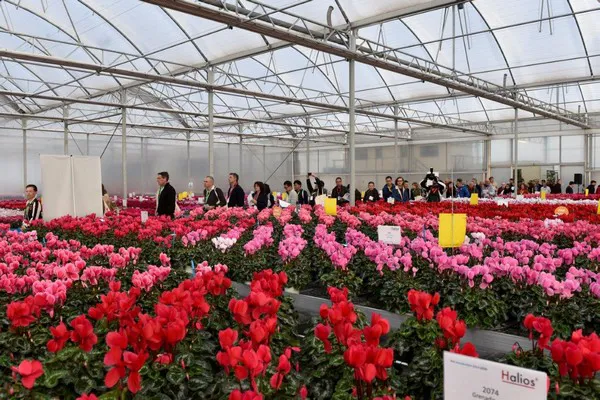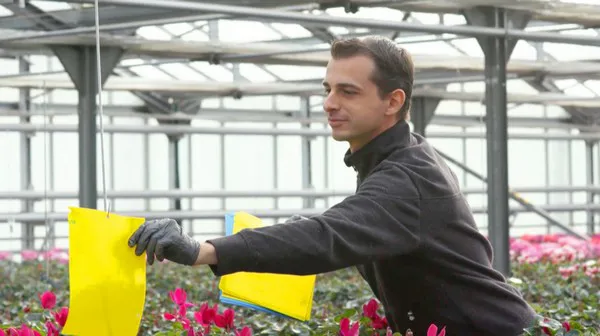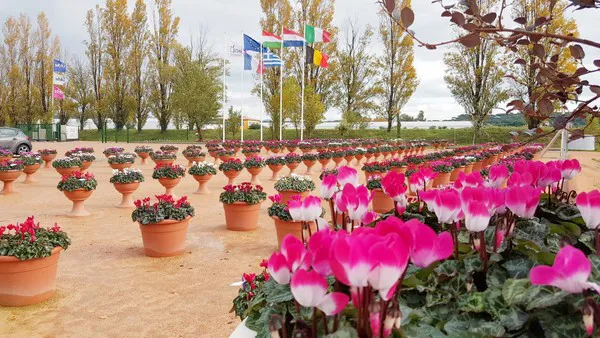For over a century, Morel has been breeding cyclamen and sustainability has always been a subject high on their priority list. For over the last 30 years now, this French company committed themselves with a sustainable culture approach. They've undertaken several initiatives to become more sustainable. "And when ecology fits in with economy, it’s a win-win situation!", says Isabelle Andre, Morel's Marketing Manager. In this article, we will mention some of the actions that have been made and some of the actions that are currently in progress to become a more sustainable company.

Photo taken during Morel's 100th anniversary celebration, last November. Click here for more pictures of this festive day.
Water management
The sustainable management of the natural resources is one of the pillars of sustainable development, Andre explains. "The water management in our horticultural sector is therefore essential to participate in the ecological transition. The water, a central element in our business and in our Mediterranean regions, is subject to optimal supervision with regard to its management and distribution in our establishments."
In order to use their water more efficiently, they set up an electro-magnetic water treatment system, without chemicals, of Aqua4D. Morel's Jacques Reussard says: "The aim of this system was to provide a long-lasting solution to the problems of clogged watering capillaries. It prevents scale and bio film deposits inside the pipes. Thanks to this technology, no more high pressure unblocking of pipes and drippers leading to an unnecessary flow of water." According to Reussard Andre, it is a remarkably innovative system that not only enabled them to achieve the previously mentioned goal, but also brought other advantages. "The beneficial effects were immediate; we saved 10% of water per year (i.e. 1000 m3), 25% of watering time as well as maintenance. On top of that, the optimised water distribution in the pots led to better root quality and therefore also healthier plants".
Energy Management
In Morel's greenhouses, also several actions were taken to reduce their carbon footprint. "First of all, we've chosen for plastic pots, instead of terracotta pots, which are more energy-consuming in terms of its manufacture and transport. Then, we automated the climate in the greenhouse according to the outside temperature for a lower energy consumption and white-washed and white-washed removed the greenhouses regularly depending on temperature and light. It all allows considerable savings on heating and better control of watering. On top of that, we are currently installing a new power analyser station that will allow us to better understand our electricity consumption."
But also in their offices, they have the same willingness to reduce CO²: "Besides the installation of LED lights, that consumer 3 times less energy, temperatures are optimised and adjusted as much as possible according to office occupancy. Also, a free-cooling system has been set up for the air conditioning system, as this part is energy-consumptive. It allows a maximum cooling of the offices thanks to an external ventilation before the air conditioners are turned on."
Recycling and waste management
Regarding the trays, they've chosen for seeding trays in recyclable PVC, rather than polystyrene. Also their used are being recycled. "100% of our plastic pots have a second life." They not only recycle the pots, by giving them to local communities, they also recycle the potting soil which is 100% reused by their neighbouring partners. Further all other products, like paper, cardboard, plastic, polystyrene, batteries, glass, ink cartridges are recycled in the appropriate channels. Even the coffee grounds are recycled for employee’s gardens compost.

Biological control
Of course, their sustainable drive is also implemented in their breeding and cultivation. "Since 1994, we are an unconditional supporters of biological control and prevention in horticultural practices. One of our major aims is to avoid pesticides and by creating healthy parental lines, by preserving our 'gene pool' and by optimising the quality and quantity of harvested seeds sold worldwide, we are able to do so."
At Morel, they are constantly searching for prophylaxis methods. These methods consist in preventing the potential threats on the crops (attacks from pests, fungi or bacteria) thanks to the tracking of the populations and of their development conditions. "In this way, we monitor our crops in the best way possible towards the ecological transition with the minimum use of chemicals."
The set up various prophylactic measures. They, for example, equipped 3.3 ha of their greenhouses with insect-proof screens, which limit the entry of insect populations and therefore reduce the need to fight against punctual invasions with chemicals. Besides, soil mulching is being carried out on all the greenhouse, allowing the suppression of weed killer and thus avoiding larval reproduction into the soil, and the drainage channels are being cleaned around the greenhouses, limiting the arrival of harmful larvae in the greenhouse. Additionally, they use use insect trapping with sticky traps and biological control against thrips with the addition of beneficials and the propagation to prolong the presence of this population of beneficials. On top of that, they are also experimenting with thrips control, using visual lures; blurring of insect vision by LED lighting in certain wavelengths.

"We defend and act for environment"
Andre: "Thanks to our tight collaboration with our suppliers of alternative solutions to chemistry, we have acquired a recognised experience in the trade and we share these good practices to all the interlocutors of our network. As true ambassadors to our worldwide network, these new biological solutions are first tested and approved internally by our engineers before being released to our partners and customers by our technical sales representatives. In line with these tests, substrate suppliers have integrated some of these solutions originally done for our “custom made” mixes. The incorporation of antagonistic fungi to Fusarium Oxysporum spp ciclaminis into the potting soil to prevent the development of pathogenic fungi has become a standard for many European horticulturists."
Efforts of research in favour of the environment
In breeding of their cyclamen varieties, the environmental impact of their varieties takes an important role. "We select plants that are more robust, less water consuming but also resistant to Botrytis and brutal temperature variations. Also, the plants are chosen for their long-lasting performances in stores and at the consumer’s home. Long-term performance of the plants, disease resistance, heat resistance and genetic diversity are all breeding criteria that guide our cyclamen towards greater respect for the environment, and this right up to the consumer."
Certifications and labels
And when acting environmentally friendly, certifications are a way to know if you are on the right track. One certification that is widely recognised in the sphere of professional horticulture, testifies about our commitment to sustainable production at all levels, is the MPS  A+ certification. In 2019, Morel obtained this certification with a score of 107/110 for the 2019 season. Other labels they have are 'Fleurs de France', which certifies the French origin or their cyclamen seed production and the 'CCVS' label for their National Collection of cyclamen persicum, a label that certifies their varietal and genetic diversity.
A+ certification. In 2019, Morel obtained this certification with a score of 107/110 for the 2019 season. Other labels they have are 'Fleurs de France', which certifies the French origin or their cyclamen seed production and the 'CCVS' label for their National Collection of cyclamen persicum, a label that certifies their varietal and genetic diversity.
 For more information
For more information
S.A.S. MOREL Diffusion
2565, Rue de Montourey
83600 Fréjus
France
Isabelle Andre
Email: isabelle.andre@cyclamen.com
T: +33 (0)4 94 19 73 04
F: +33 (0)4 94 19 73 19
www.cyclamen.com
www.indiaka.cyclamen.com
